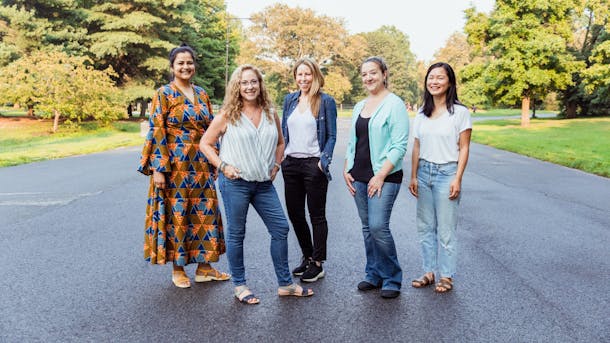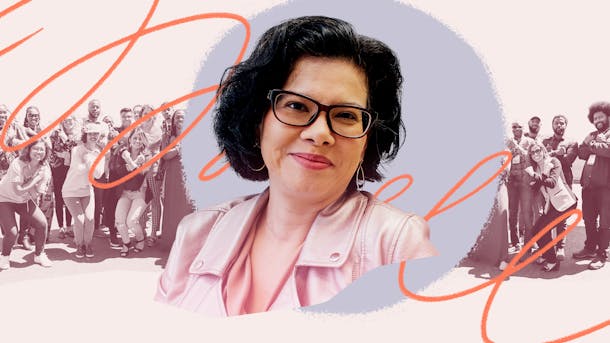
Feature Story
Radical self-honesty is Connie Matisse’s superpower
From day one, the CEO and co-founder of East Fork has been transparent about values and committed to being a good neighbor. The result? A rapidly growing pottery company with a loyal customer base.
“In the spirit of transparency, it's been a hard few weeks for me,” Connie Matisse said on our Zoom call, roughly two minutes after meeting me for the first time. (About 40 minutes after meeting me, she told me about a deeply emotional, “life-altering moment” she once had — but we’ll get to that later).
Connie is the co-founder and CEO of the explosively popular East Fork, a ceramic manufacturer and home goods retailer fiercely committed to its handmade origins, making dinnerware with “regional clays and integrity” in Asheville, North Carolina.
It’s rare to find a company that stays as true to itself and its values as East Fork. Maybe that’s because the woman at the helm is a lot of things — a writer, marketer, artist, mother, and activist, to name a few — while also managing to be consistently one thing: herself. “My pitch, as a founder, is just radical self-honesty,” she told me.
Connie joined the call from her office inside the Asheville factory, with its smooth, concrete floor subtly dotted with clay and paint, and East Fork’s iconic bowls and plates stacked neatly in various pockets of the background — an intentional, orderly chaos.
Answering all my questions with both warmth and directness, she chatted through the ins and outs of running a growing business while pausing to field the occasional text from her husband and co-founder, Alex Matisse (who Connie refers to as “the original lifeforce” of the company), to coordinate childcare for their two young daughters.
The “hard few weeks” Connie mentioned at the outset of our conversation followed a major shift for East Fork’s leadership team (and company as a whole) earlier this year. After seeing record-breaking growth in 2020 and hiring their 100th employee, Connie, Alex, and their co-founder and CFO John Vigeland spent several months unpacking their leadership team dynamics and assessing company needs.
One big outcome of these conversations was Connie’s transition from CMO to CEO, as Alex — East Fork’s former (and first) CEO — took on a new role of board chair.

A transition into the role of CEO and out of the weeds
As CMO, Connie had long been the driving force behind the personality and brand East Fork customers have come to love. And, she said, there were so many parts of the role she loved — storytelling, talking to customers, dreaming up creative product imagery and new brand collaborations. Plus, she was good at it. In Alex’s blog post about the CEO transition, he credits Connie with giving East Fork the “voice and purpose and passion” that made it such a vibrant and values-oriented company.
But as East Fork continued to grow, so did Connie’s realization that some of her key skills as a leader were being underutilized.
“It felt super limiting for me, because what I am really good at is looking around at something more holistically and seeing how various things impact one another — and understanding how to put systems in place and get the right people in the room to collectively problem-solve,” she said. “And I wanted to do more of that, but I wasn't really positioned in the company to do it.”
This mismatch of responsibilities and skill set manifested in what Connie described as serious “backseat driving.” Without formal business school degrees or any sort of traditional entrepreneurship training, the three founders trudged through their seasons of growth without a lot of clarity around what it meant to function as a leadership unit and how scaling so quickly would impact everyone working for East Fork.
“When you're thrust into these sorts of leadership positions, you're confronted with how you show up in times of stress and how that can be really useful or damaging,” Connie said. “The three of us quickly realized that if we didn’t get to the bottom of our own personal inner demons and completely redesign how we approach our relationships with work and our relationships with each other — we were going to cause harm to ourselves and to everyone around us.”
In April 2021, after countless hours of deep emotional, interpersonal, and professional development with other members of the leadership team, Connie officially assumed the role of CEO — a move she describes as both an obvious next step for East Fork as well as an overwhelming change for her personally.
“The last few months of me stepping into the role have been a process of rediscovering myself and who I am,” she said. “And learning what happens to me when I neglect my own needs and all the excuses I make for not being able to get out of the weeds.”
The inability to “get out of the weeds” is a challenge faced by countless founders, especially during periods of rapid growth. For Connie, it spiraled into a difficult (but ultimately necessary) lesson in burnout. The stress and pressures of the new role made her sick to the point of brief hospitalization — an outcome that could have been prevented had she taken better basic care of herself, she said.
“Everybody who cares about me and knows me and loves me had been telling me, ‘You're going to wake up one day and you're going to realize that you've neglected yourself to the point of no return. And if you keep thinking that you need to show up in the way that you're showing up, it's going to destroy you,’” Connie said. “But I couldn't learn that lesson until I learned it the hardest way possible.”
After a much-needed break, she returned to work with a newfound commitment to staying out of the weeds and a little more compassion for herself. In order to focus on the areas of growth that need her attention most — a robust staffing and hiring plan to scale marketing and sales teams, for example — Connie knew she had to trust her team to figure things out for themselves.
Re-establishing how she approaches work has involved unlearning many of the false narratives she convinced herself were true in order to get East Fork to where it is today — namely, that she cannot (and should not) have control over everything that happens at the company on a daily basis.
“We have a $20 million business, and that happened because I have been a little bit ruthless in my approach to work,” Connie said. “But that’s not serving me anymore. We are going to continue this rapid growth in a way that's a lot more loving to the types of leaders and people we are.”
So far, that’s meant more introspection and self-care. And as she continues to lead East Fork from a place of radical transparency and honesty, it also means everyone else — employees, customers, anyone in the East Fork universe — gets to stay keyed into that journey along with her, too.
We are going to continue this rapid growth in a way that's a lot more loving to the types of leaders and people we are.
Pottery draws in customers, values keep them for good
The East Fork team lovingly planted their roots in the Blue Ridge Mountains (partly for the proximity to an iron-rich clay that’s workable, durable, and malleable), but their growing, ultra-loyal customer base stretches coast-to-coast. Their most popular item, dubbed “#TheMug” by fans, has been known to sell out within minutes when a new glaze is released. Beyond the factory, which holds the nation’s biggest collection of 20th century pottery-making equipment, the team operates storefronts in both Asheville and Atlanta.
But East Fork has become much more than a stylish brand for the design-savvy consumer — it’s an enduring relic of American craftsmanship and, more importantly, a group of people who care a whole lot about the mark they’re making on their local community, the planet, and society at large. Customers flock to East Fork to be part of something much bigger.
In fact, during my conversation with Connie — the CEO of a pottery company — we didn’t actually talk about pottery, even once.

Looking at their ceramic products, aesthetically pleasing and creatively marketed, it’s easy to see how they’ve been successful. But if you dig deeper (or quickly glance at the comments on any given blog post), you’ll find a loyal community of customers, new and old, who have bought into all that East Fork promotes as a company.
East Fork’s quest to build an increasingly equitable, inclusive world permeates every part of the business. It’s also something the team — Connie, mostly — talks and writes about regularly and extensively.
Across East Fork’s site, you can read through the plethora of ways the team has committed to dismantling oppressive systems through the ways they operate internally, and they provide plenty of ways for customers to take action, too. By purchasing “Seconds” (pottery that doesn’t pass East Fork’s rigorous standards for full retail sale, but looks just as appealing to the untrained eye) customers donate to one of East Fork’s nonprofit community partners who are “working toward racial equity, community reconciliation, and supporting the liberation of folks who’ve been systematically oppressed by white supremacy, patriarchy, and heteronormativity.”
But more important than being outspoken about their values (and how they implement them), Connie and team are just as honest about their shortcomings. When they recently became a certified B Corporation, further codifying their commitment to equity and sustainability, they shared the news alongside a description of the areas where they most need to improve and how they plan to do so down the road.
According to Connie, this level of honesty makes for a much more straightforward marketing strategy — and it’s one of the reasons they’ve been able to keep their marketing budget so lean for so long.

At this point, there's so much that we're doing internally that my goal is to just share that story honestly, make it digestible, and point it back to why the business exists in the first place. There's no artifice in it.
Transparency is the key to East Fork’s appeal
From company policies that promote justice, to their compensation philosophy, all the way to the founders' enneagram types (Connie’s an 8), it’s tough to write anything new about East Fork that’s not readily available on one of their many communication channels. They’re transparent about everything: quarterly finances, the small- and large-scale production methods they use to make their pottery, what motherhood looked and felt like in peak quarantine, and an infinite array of other topics.
The vibrant East Fork Instagram account is where Connie’s personality shines through most. “Whenever you see something real in the captions, it’s from me, usually in the bathtub or the bathroom, typing with my thumbs,” she said.
Transparency isn’t just a marketing tactic for Connie, though. Telling East Fork’s story as authentically as possible holds them accountable and keeps them honest — the old-fashioned way.
“Before the age of ‘marketing,’ businesses stuck around because the products were good and they had a good reputation,” Connie said. “They treated their people well, and it was more about being a decent person in your community than it was smoke and mirrors.”
By this definition, East Fork is expanding its neighborhood at an incredible pace. They’ve grown by three times in revenue and headcount every year for the last three years.
East Fork’s openness with customers does present its challenges, though: The more information a company shares, the more it conditions people to think they know everything about the company and its internal decision-making processes. But honesty will always be the best policy for East Fork — mostly because it’s part of who Connie is, and it’s the only way she knows how to operate.
“When we started out — and we started being really vocal about our approach to our work — it never felt scary for me, partly because I never came from a business background,” she mused. “I came from just being a person who says whatever the heck they want, all the time, in any place.”
Turning mistakes and self-awareness into policy
From day one, the founders set out to build an ecosystem at East Fork that creates more pathways to equity and prioritizes living wages and benefits for employees at every level of the organization. Since their formal founding in 2015, East Fork’s manufacturing jobs have given Asheville-area workers the opportunity to build more stable lives for themselves and their families. Earlier this year, they achieved a longtime goal of setting a company-wide minimum wage of $20 an hour.
But like most founders do in the early days of building a business, Connie, Alex, and John had plenty of missteps — especially when it came to recruiting and hiring. Their biggest oversight, Connie said, was not taking enough time to unearth all of the ways their company values were misaligned with their internal practices.
“We had a world of ideas versus a world of action, and it took a few years for us to understand how to get those two in sync,” Connie reflected. “Especially as a high-growth startup at the early stages, cutting corners is the only way to go sometimes. And we made a lot of mistakes."
The founders got stuck in a cycle of hiring friends and friends of friends, until they stepped back and took an honest look at the majority-white culture they were creating at the company — one that continued to pull in homogenous voices and demographics.
“In order to build a bridge to people who have incredible potential to add to your team, you need to expand your community,” Connie advised.
What was most helpful in stopping that cycle (and what Connie leans on harder than ever as CEO today) was policy.
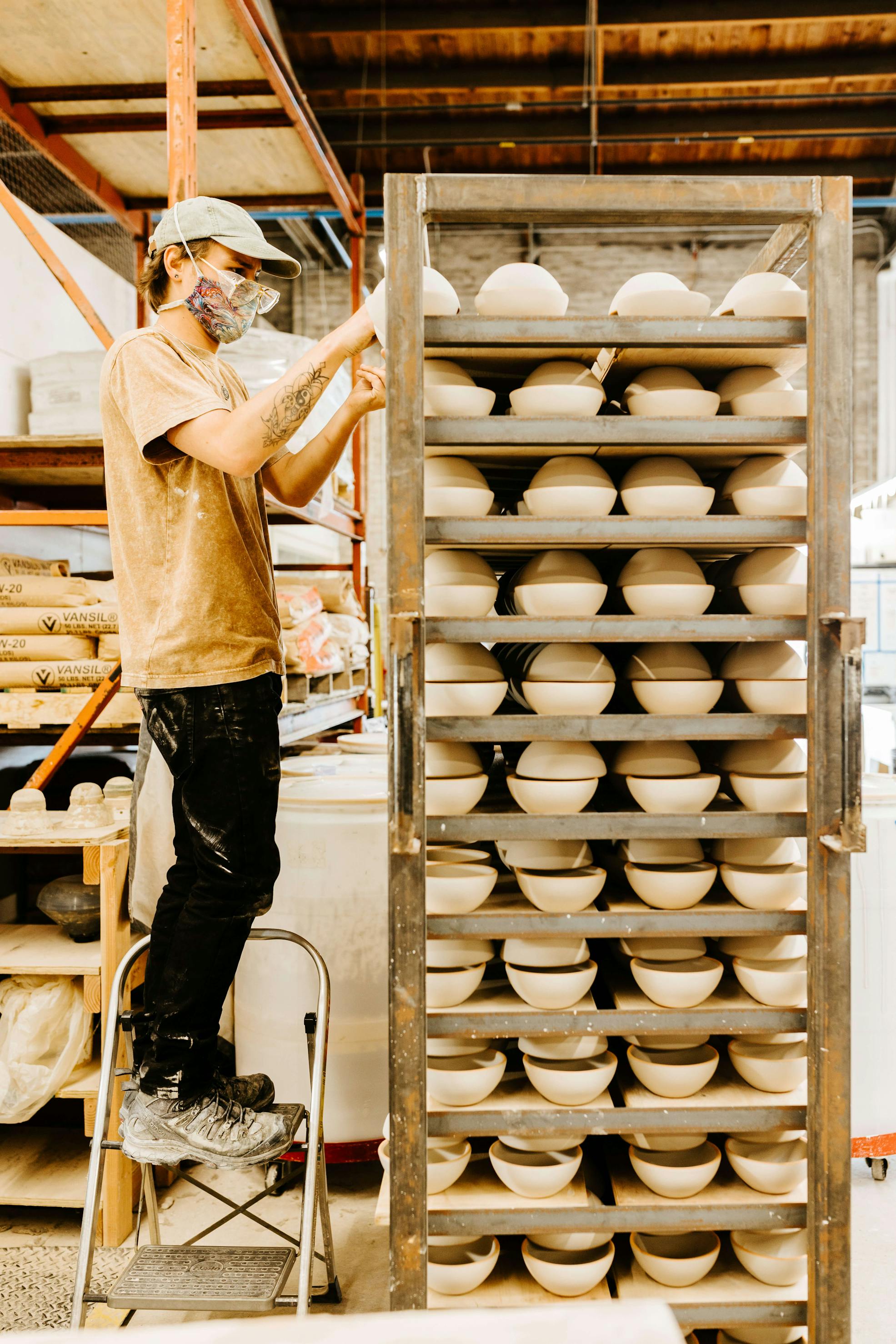

Today, East Fork’s recruiting, hiring, and staffing plans involve a thoughtful process they never rush through or take lightly. Connie warns that while hiring with speed and urgency might yield people who have résumés aligned with the role, you risk missing a more thorough screening for competencies around problem-solving, talking through cultural differences, or the ability to use language in a way that promotes justice.
In addition to working with several community partners on diverse talent recruitment (with whom East Fork has built “long-term, mutually beneficial relationships”), they also kick off each hiring process internally with structure and clarity. It starts with a “structured hiring document” that helps the team align on the needs and key indicators of success for a particular role, followed by a transparent job description, which always lists salary and defines expectations for the role in the most honest way possible — to help set up candidates of all backgrounds for success from the onset.
But the value of strong policy does not — and should never — stop with hiring. “Once you do the work of diversifying your employee pool, you better make sure the people who have to navigate the world of microaggressions are supported in your workplace,” Connie said.
At East Fork, that support takes shape in a variety of ways: community resource groups, inclusive benefits, progressive drug and alcohol policies (i.e., not requiring drug testing for jobs that don't need drug testing), caucuses for Black and Brown team members to talk about the ways racism shows up at work, and required trainings for all employees on gender and racial equity.
Policy isn’t the most exciting, attention-grabbing way to prove your values, but it’s the only way to hold yourself accountable for actually living them. For Connie, it all goes back to being radically honest with consumers, candidates, and employees — but most of all, with yourself as the leader of the company.
“A lot of companies jump into collaborations and fundraisers and all of the flashy parts that are easier to market,” Connie said. “But if you're doing all of that and you're not paying attention to how supremacy is manifesting in your own workplace, you're doing it all wrong.”
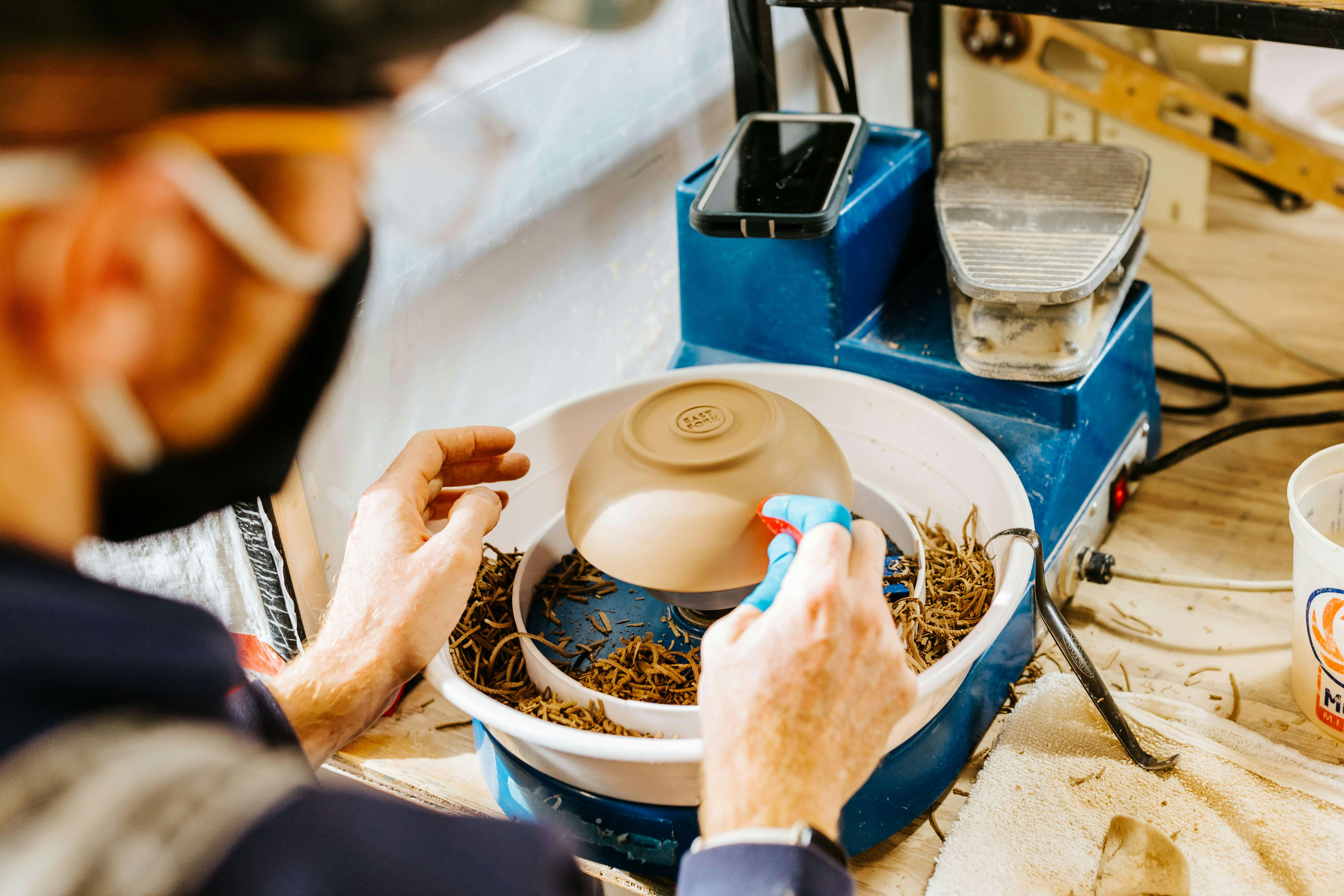
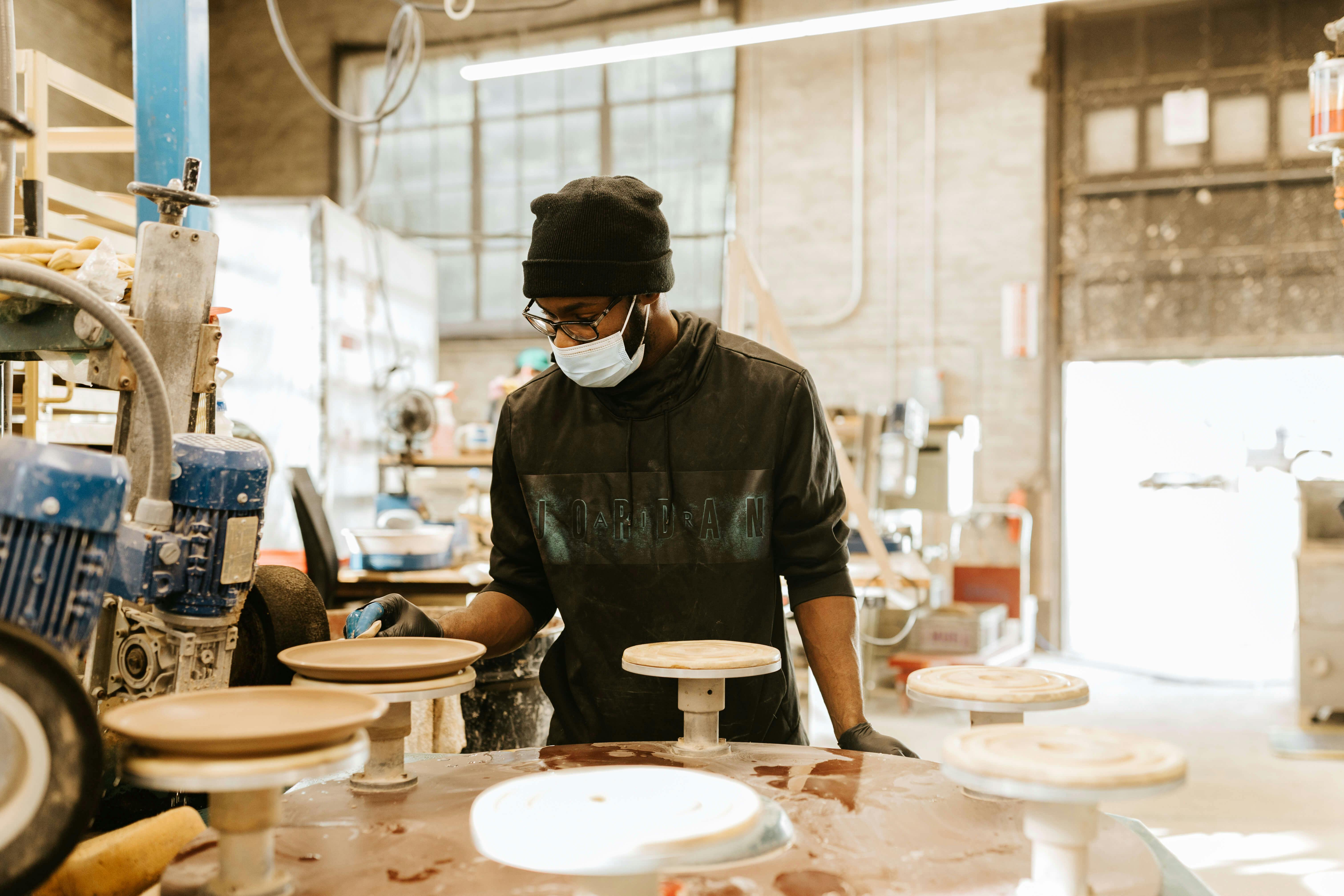

Leading a company on the rise
What’s next for Connie and East Fork? A lot. They’re releasing two new colors this winter (“Black Mountain” and “Rococo”), hiring for dozens of positions over the next 18 months, and with newly announced funding from their first institutional partner, they are positioned to become the largest domestic manufacturer and seller of ceramic dinnerware.
Finding values-aligned investors has always been East Fork’s intention (and “something that, early on, terrified me,” Connie admits). That’s why they’ve exclusively brought in investors who support East Fork’s honest, values-first approach and are on board with the founders’ growth-related goals for their company — which don’t include an acquisition or big IPO.
And with quick company growth on the horizon for East Fork (and already happening!), Connie will keep steering the ship and growing into her role as CEO — even if her job today is a slight departure from those she used to imagine having when she grew up: editor of Vanity Fair, politician, or food writer, among others.
“Just a couple of days ago, I thought to myself, I really like my job and I’m good at it,” she said. “It's actually allowing me to bring all of my interests together in a really beautiful way that’s making a social impact.”
Toward the end of our conversation, I sprung one final question on Connie — one I actually borrowed from the East Fork page where they introduce their Atlanta showroom team: “Tell me about a time you saw something so beautiful you cried, screamed, gasped, or just busted up laughing?”
Her answer was too real and too good not to share, unedited. So, here it is: Connie Matisse, East Fork co-founder and CEO — effortless in her honesty, which also happens to be her (and East Fork’s) superpower.
"I’ve had all of my most life-altering moments at the ocean at night. I’ve had two experiences at the beach — both of them right after a loved one had died — where I couldn't sleep in the middle of the night. I woke up, found myself bathed in moonlight, alone, feeling all of the deep well of human sadness and standing at the edge of the ocean, and just being confronted with the enormity of it.
I let my brain drift to thinking about the enormity of the universe, and suddenly felt so small and humbled. And I realized if I could just melt away into the ocean, the world would still keep going. The world is so expansive and human existence is so expansive, and that can be so crushing and terrifying. But it can also be so freeing, especially for someone who has control issues, who thinks that I can somehow maneuver life in a way where all of the outcomes can be predicted.
Being confronted with nature in that way reminds me that there is something about truly letting go and understanding that there's so much out of our control. It’s so humbling and important, thinking about all of the billions of people who are having the same level of feelings.
And you're like, I’ve got this. I got it. It's not true that nobody has ever been sadder than I have. Everyone's f*cking sad. But we're in it together."
Written by Hillary Noble



